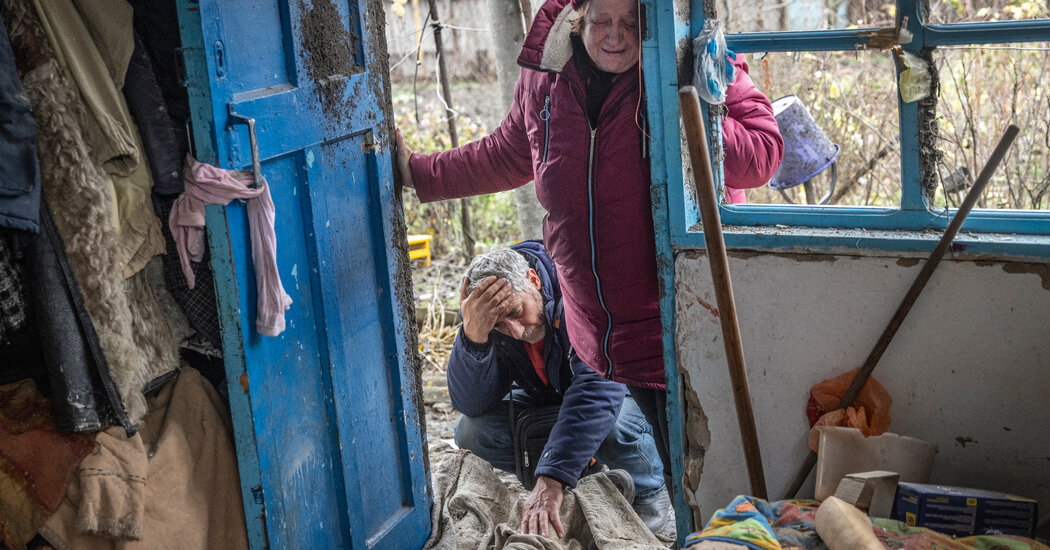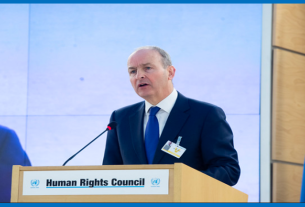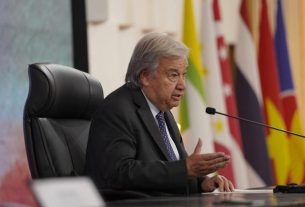KHERSON, Ukraine — The explosions were audible in the center of Kherson city, recently freed from Russian occupation. A quick check with a Ukrainian first-response team confirmed that it was a Russian missile attack, and that it had targeted a tiny settlement of little or no strategic value on the shores of the broad Dnipro River. We quickly set off.
There is a grim monotony to many daily reports from the Ukraine war. A town or village is hit with shells or missiles, an accounting is made of the dead and wounded, usually accompanied by a comment from a local official. And the world shrugs and moves on, often oblivious to the terrible impact on families and lives.
The following photographs capture the reality — the randomness of death, the often life-changing violence and suffering visited in one terrible moment — that is often overlooked in these attacks.
Russia sent half a dozen rockets at the settlement, a part of Kherson city, that day. In the immediate aftermath, residents rushed to and fro, sometimes at a sprint, searching for victims, helping the wounded and dousing whatever fires raged. It seemed like everyone was on the move.
It quickly emerged that one person had been killed, Dmytro Dudnyk, whose body lay just in the doorway of the house of his mother-in-law, Svitlana Zubova. She had been preparing to make lunch, she said, and Mr. Dudnyk had just brought her a chocolate bar for them to share over tea after the meal, when the rockets slammed into the neighborhood.
One exploded in her yard, knocking Mr. Dudnyk senseless and, ultimately, killing him. As neighbors dashed by with buckets of water to douse the flames of two nearby houses, he lay in a pool of blood on her floor.
Mr. Dudnyk, 38, worked as a seaman on a cargo ship, but his contract was on hold because of the war. He had sent his wife and two daughters, 8 and 13, to stay with his parents in the nearby city of Mykolaiv just two weeks earlier, as security around Kherson deteriorated following the withdrawal of Russian troops, who began lobbing missiles and artillery shells into the area from the other side of the river.
But he had insisted on staying in Kherson to look after the dogs and chickens at his home next door to his mother-in-law’s.
The explosions shattered the morning air with a shocking suddenness. “His last words were, ‘Mom, here’s a chocolate bar for you,’” Ms. Zubova said. “He went out and it exploded before I put the potatoes in a frying pan.”
Two houses were on fire on the street as firefighters and ambulances arrived. The owner of one house, who gave only his first name, Pavlo, was trying to fix his water bucket as flames licked a hole in the roof. Neighbors came running to his house with buckets of water, while others helped families rescue loved ones from damaged homes.
Down the street, Anatoliy Anatoliyovych, 83, leaned against his neighbor’s fence as flames engulfed his home. He was blind, he told a firefighter, and did not know where his wife was. She had gone to the store just before the shelling, he said.
The firefighters sprayed water on his house until their tank ran dry. They asked a resident if there was a water supply on the street. There was a connection but no running water, she said. Kherson city has been largely without electricity and running water since the Russians destroyed much of its utilities as they retreated. A second truck arrived to help, but the house was already gutted.
At another badly damaged house, paramedics carried out a bedridden 85-year-old woman, Lyudmila, taking her to a neighbor’s house across the street. Lyudmila was given the neighbor’s daughter’s room, while her family began photographing the damage to their home — for insurance purposes, they said.
Back at Ms. Zubova’s house, Mr. Dudnyk’s wife and parents arrived from Mykolaiv, about 60 miles away, screaming and weeping as they rushed to his body, where it still lay across the threshold. His wife wept at his side as his dog circled his feet.
“Why? Why? Why you?” his mother, Iryna, screamed at the sky.
Ambulance staff had refused to take him away, telling the family they had to call the morgue service.
“I was asking him to leave,” his father, Viktor, said, “even this morning. He said, ‘I don’t want to leave the house, dogs, chickens.’ But who needs that all now?”
The police arrived to record the death. Ms. Zubova rang the numbers the police gave her for the body collectors, but the first number didn’t work and the person answering the second said they could not travel to Kherson. Then her cellphone ran out of credit. Eventually, a team did show up to remove Mr. Dudnyk’s corpse.
Pacing around the yard, Ms. Zubova kicked bomb debris from the path. “I don’t know what to do now,” she said, “how to go on living.”
As the commotion died down, the small riverside community seemed an undeserving, even senseless, target of Russian rockets, as there were no signs of Ukrainian troops in the area. But, perhaps, in this brutal war of indiscriminate Russian violence, that was precisely the point.



